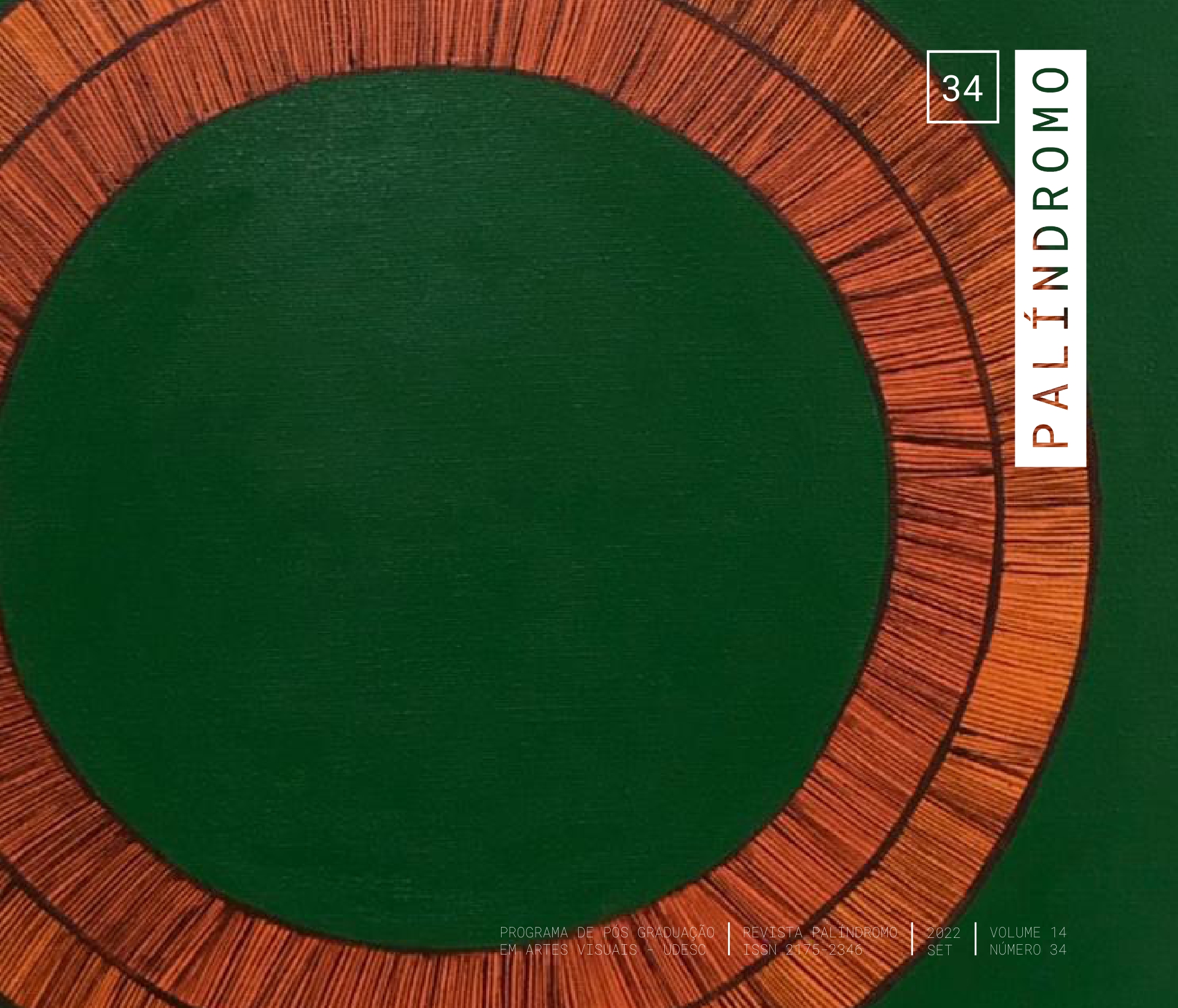From tropicamp to tropicuir: writing histories from sex and gender dissident art
DOI:
https://doi.org/10.5965/2175234614342022058Keywords:
Helio Oiticica, Gender and sexuality, Queer theory, Art historyAbstract
This article seeks to reflect on ways of writing dissident sex and gender histories through the arts, through a dialogue with several manuscripts of the artist Hélio Oticica and an experimental exercise on the term tropicuir, coined by me during my master's and doctoral studies, from which the present text derives. Based on queer and cuir theoretical reflections - including Foucault, Preciado, Rolnik and Gómez-Peña - I defend the hypothesis that insurgent aesthetic productions of gender and sex-dissident people act as generating machines of contranormative subjectivations that is, as networked micropolitical actions, counter-sexualities have been conforming collective memory of existences historically invisibilized in the shifting and violent Brazilian territory.
Downloads
References
ALTMAYER, Guilherme. Tropicuir. (Re)existências políticas nas ações performáticas de corpos transviados no Rio de Janeiro. Dissertação de mestrado, Departamento de Artes e Design, PUC-Rio, Rio de Janeiro, 2016. Disponível em https://www.maxwell.vrac.puc-rio.br/27275/27275.PDF. Acesso em 10 jul. 2022.
BENTO Berenice. É o queer tem pra hoje? Revista Áskesis, v. 4, no 1, p. 143-155, jan-jun 2015. Disponível em https://www.revistaaskesis.ufscar.br/index.php/askesis/article/view/61. Acesso em 05 jul. 2022.
CRUZ Max Jorge Hinderer, Tropicamp: Some notes on Hélio Oiticica’s 1971 text, Afterall, no 28, 2011. Disponível em https://www.afterall.org/article/tropicamp-pre-and-post-tropic-lia-at-once-some-contextual-notes-onh-lio-oiticica-s-1971-te. Acesso em 03 mar. 2022. DOI: https://doi.org/10.1086/662966
FOUCAULT Michel, História da Sexualidade I: a vontade de saber, Rio de Janeiro: Edições Graal, 1998.
GÓMEZ-PEÑA Guillermo. Ethno-techno. Writings on performance, activism and pedagogy, New York: Routledge, 2005.
GUATTARI, Félix. Revolução molecular: pulsações políticas do desejo, São Paulo: Brasiliense, 1981.
HALBERSTAM Jack. What’s that Smell?: Queer Temporalities and Subcultural Lives, International Journal of Cultural Studies, v. 6, no 3, 2003, p. 313–333. Disponível em https://doi.org/10.1177/13678779030063005. Acesso em 10 mar. 2022. DOI: https://doi.org/10.1177/13678779030063005
HOCQUENGHEM Guy. Homosexual desire, Durham: Duke University Press, 2006.
OITICICA Hélio. Brasil diarreia, Manuscrito, fev 1970. Disponível em <http://www.itaucultural.org.br/programaho/>. Acesso em 20 mar. 2022.
OITICICA Hélio. Mario Montez: Tropicamp, manuscrito, out 1971. Disponível em http://www.itaucultural.org.br/programaho/. Acesso em 15 mar. 2022.
PERRA, Hija de. Interpretações imundas de como a Teoria Queer coloniza nosso contexto sudaca, pobre de aspirações e terceiro-mundista, perturbando com novas construções de gênero aos humanos encantados com a heteronorma. Salvador: Revista Periódicus, 2ª edição, novembro 2014 - abril 2015. Disponível em https://portalseer.ufba.br/index.php/revistaperiodicus/article/view/12896. Acesso em 07 ju. 2022.
PRECIADO Paul B. Terror anal: apuntes sobre los primeiros días de la revolución sexual, in Guy Hocquenghem, El deseo homosexual, Madrid: Melusina, 2009, p. 135-172.
PRECIADO Paul B. Manifesto contra-sexual, Madrid: Editorial Opera Prima, 2002.
ROLNIK Suely Esquizoanálise e antropofagia, in Gilles Deleuze: Uma vida filosófica, São Paulo: Editora 34, 2000, p. 451-462. Disponível em https://www.pucsp.br/nucleodesubjetividade/Textos/SUELY/Antropesquizoan.pdf. Acesso em 20 mar. 2022.
ROLNIK Suely. Furor de arquivo, Revista Artes & Ensaios, Rio de Janeiro, no 19, 2009. Disponível em http://www.ppgav.eba.ufrj.br/wp-content/uploads/2012/01/ae22_Suely_Rolnik.pdf. Acesso em 13 mar. 2022.
SANTIAGO Silviano. Uma literatura nos trópicos: ensaios sobre dependência cultural, Rio de Janeiro: Rocco, 2000.
Downloads
Published
How to Cite
Issue
Section
License
Copyright (c) 2022 Guilherme Altmayer

This work is licensed under a Creative Commons Attribution 4.0 International License.
COPYRIGHT STATEMENT
The articles published by the magazine are free to use, intended for academic and non-commercial applications. Copyright is all assigned to the magazine. The articles whose authors are identified represent the expression from the point of view of their authors and not the official position of Palíndromo Magazine. The author (s) commits to whenever they publish material referring to the article published in Palíndromo mention this publication as follows:
This article was originally published by Palíndromo magazine in its volume (place the volume), number (place the number) in the year of (place the year) and can be accessed at: http://www.revistas.udesc.br/index.php/palindromo


